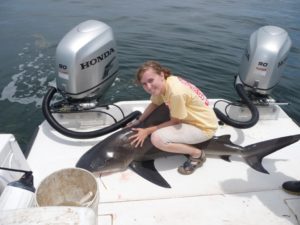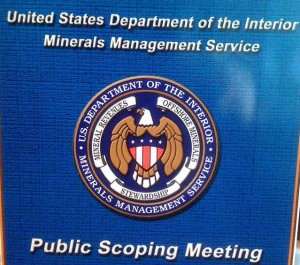 Mariah Pfleger is a marine scientist at Oceana, an international marine conservation non-profit, advising both the responsible fishing and sharks campaigns. She graduated from Florida State University in 2012 where she studied coastal sharks and their relatives. In 2016 she earned her Master’s degree from the University of West Florida where she researched both coastal and deep-water sharks and rays. Mariah worked for 3 years as a field assistant, and during her Master’s an additional 3 years as a field manager, on the Gulf of Mexico Shark Pupping and Nursery Program. She has also conducted research using environmental DNA to detect rare and endangered sturgeon. Her twitter handle is @MariahPfleger.
Mariah Pfleger is a marine scientist at Oceana, an international marine conservation non-profit, advising both the responsible fishing and sharks campaigns. She graduated from Florida State University in 2012 where she studied coastal sharks and their relatives. In 2016 she earned her Master’s degree from the University of West Florida where she researched both coastal and deep-water sharks and rays. Mariah worked for 3 years as a field assistant, and during her Master’s an additional 3 years as a field manager, on the Gulf of Mexico Shark Pupping and Nursery Program. She has also conducted research using environmental DNA to detect rare and endangered sturgeon. Her twitter handle is @MariahPfleger.
The demand for shark fins is widely recognized as one of the major contributors to shark mortality around the world. However, solutions to decrease this demand are hotly debated, especially in the scientific community. Southern Fried Science and other websites have published opinions that debate the effectiveness of shark fin bans, but as a shark scientist working to implement this policy I would like to present the case for shark fin trade bans.
The conversation is newly relevant with the introduction of the Shark Fin Trade Elimination Act in the Senate on March 30th by Senators Cory Booker (D-NJ) and Shelly Moore-Capito (R-WV) and in the House on March 9th by Representatives Ed Royce (R-CA) and Gregorio Kilili Camacho Sablan (I-MP). If passed, the bill would ban the buying and selling of shark fins in the United States – thereby removing the United States from the global shark fin trade altogether. The bill is championed by Oceana, where I work as the scientist on the sharks campaign.
The demand for fins fuels finning – the act of slicing off a shark’s fins and dumping the body back into the ocean. The United States recognized this practice was a problem and implemented the Shark Finning Prohibition Act of 2000 followed by the Shark Conservation Act (SCA) in 2010, which required that all sharks must be landed with their fins naturally attached (except for smooth dogfish, which can be landed under a fin-to-carcass ratio). However, according to the National Marine Fisheries Service, the United States is still importing fins from places like Hong Kong, China, New Zealand, the Netherlands, Spain, South Africa and Indonesia, to name a few. Not all of these countries have anti-finning laws, which means that the United States may be, and likely is, purchasing fins from finned sharks. Once in the United States market, there is no way to tell whether a fin came from a finned shark or not. By purchasing these fins, the United States is sustaining the demand for this unsustainable practice.


